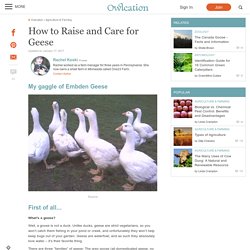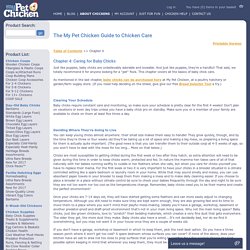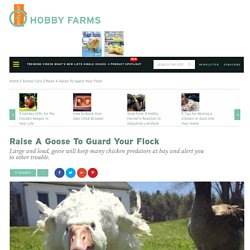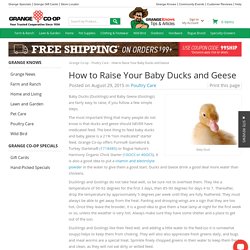

Stitcher. Episode-1396- All About Keeping Chickens. Our Rooster Upgrayedd More than Earns His Keep I think perhaps the hottest thing in the modern homesteading trend right now is keeping chickens for both meat and eggs.

It isn’t hard to understand why! The chicken and mankind go back thousands of years as allies. 12 Chicken 101 Podcasts. Best Poultry Podcasts (2020) How to Raise and Care for Geese. Have you ever heard of “weeder geese”?

I hadn’t until this year, when I bought my eight little goslings in March and started researching how I might be able to use them here on the farm. Geese eat mainly grass, and some clovers. Other broad-leaf weeds aren’t their favorites, but if you have a particular weed that just loves to grow in your garden, you can try introducing it to your goslings when they are very young. This may help them develop a taste for it. Geese can be used to help you weed your garden.
Using geese to weed your garden will take some planning and management. I have run my geese amidst carrots, peppers, corn, turnips, onions, poll beans, peas, hops, pumpkins, squash, melons, lettuces, rye, tomatoes, potatoes, and sunflowers. Some people report having success using geese to weed tomatoes. How to Raise Baby Chicks.
Just like puppies, baby chicks are unbelievably adorable and loveable.

And just like puppies, they're a handful! That said, we totally recommend it for anyone looking for a "pet" flock. This chapter covers all the basics of baby chick care. As mentioned in the last chapter, baby chicks can be purchased here at My Pet Chicken, at a poultry hatchery or garden/farm supply store. (If you need help deciding on the breed, give give our free Breed Selector Tool a try.) Baby chicks require constant care and monitoring, so make sure your schedule is pretty clear for the first 4 weeks! Chicks are most susceptible to getting chilled during the first week or two after they hatch, so extra attention will need to be given during this time in order to keep chicks warm, protected and fed.
Once your chicks are 7-14 days old, they will have started getting some feathers and can more easily adjust to changing temperature. This is the one of the most important part of raising happy, healthy chicks. Raise A Goose To Guard Your Flock - Hobby Farms. PHOTO: Kirsten Lie-Nielsen Geese can make excellent guardians for a flock of smaller birds, where their temperamental reputation comes in handy.

Naturally territorial, geese fit easily into the role of watchdog and don’t need any training in how to protect. Predator Protection Geese are not big enough to fend off the larger predators, such as coyotes or big cats, so they’re most effective when used in combination with good fencing. Geese can certainly fend off weasels, skunks and other rodents, though, which will often prey on chickens or try sneaking eggs from your birds’ nests. While not always able to protect against them, geese are remarkable alarms when they see flying predators.
Using A Single Guard Goose Surprisingly, a single goose can often provide the best protection for a flock of chickens. One goose is also an inexpensive option to protect a flock of chickens because they are such easy keepers. Beginner's Guide to Keeping Geese. Geese have to top of my list as being the most economical poultry on smallholdings or even when kept in the garden when space allows a reasonable amount of good quality grazing so I thought it would be a good idea to write a beginner’s guide to keeping geese for people wondering whether geese are right for them, or would like to take the plunge and start keeping geese.

Firstly, the majority of a goose’s diet is grass. As a general rule of thumb, a quarter of an acre of grass (a reasonably sized lawn in most gardens) would be sufficient to provide a pair of geese with enough grass through the year, although most people also feed wheat these days which can top up a goose’s diet. It’s important to remember that winter grass doesn’t have the same quality as grass growing in the spring. Geese don’t generally fall ill if they are kept correctly, (they don’t suffer from red mite like chickens thank goodness) so other than routine worming, don’t require much in the way of medication. How to Raise Your Baby Ducks and Geese - Grange Co-op. Baby Duck Baby Ducks (Ducklings) and Baby Geese (Goslings) are fairly easy to raise, if you follow a few simple steps.

The most important thing that many people do not know is that ducks and geese should NEVER have medicated feed. The best thing to feed baby ducks and baby geese is a 21% “non medicated” starter feed. Grange Co-op offers Purina® Gamebird & Turkey Startena® (1718485) or Rogue Nature’s Harmony Organic Chick Starter (10OCS or 40OCS). It is also a good idea to put a vitamin and electrolyte powder in the water to give them a good start.
Ducklings and Goslings do not take heat well, so be sure not to overheat them.